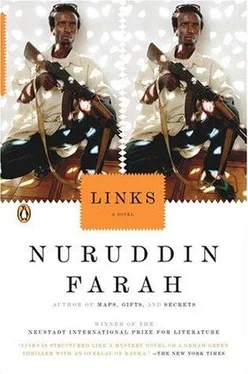“Have you any idea what he was saying to you?”
“Not really,” Dajaal replied. “But he explained it this way: that for his self-fulfillment, a torturer will be content to torture a victim wherever he may come across one.”
When Jeebleh said, “Thank you,” he did not know whether he was thanking Dajaal for the lift or for the details of what Bile had said, or simply bringing their conversation to an abrupt end because he was feeling uncomfortable.
Jeebleh got out of the car. Dajaal chose not to accompany him, but to wait outside until he was sure that his presence was no longer needed.
JEEBLEH WAS SURPRISED THAT SHANTA DIDN’T EVEN BOTHER TO WELCOME him or thank him for coming promptly. As soon as she saw him, she cursed: “The son of a bitch has called.”
He was tempted to say, “Where are your manners?” but decided to make an allowance for Shanta. Of course, he could guess whom she meant, and he waited for her to say more. There was rage in her voice, old rage mixed with new.
“Did he say where he was calling from?”
“He sounded so close that it could’ve been from the house next door,” she said. Then she turned her back on Jeebleh and, again cursing like a drill sergeant—“The son of a bitch”—walked away. He didn’t follow her inside immediately.
He averted is gaze, finding no pleasure in seeing her curves through the diaphanous dress she wore, a garment adorned with fluttering birds. He thought of his wife, to whom he had spoken the day before.
Shanta made him even more uncomfortable with her abusive language. “The son of a donkey has rung, but doesn’t want to speak to me. Can you believe it?”
He entered the house and shut the door. He reminded himself how he had been reared in a venerable tradition in which you pretended that nothing untoward had taken place if a respectable person misbehaved in your presence.
“Would you like a cup of tea, while we’re waiting?” she asked.
He wondered whether it was wise to have tea with her or even to wait, when he didn’t know why he was waiting, precisely for whom or for what, or for how long. That she continued to swear irritated him greatly, he had no idea why. He spoke slowly: “Tell me if I’m right. Faahiye, your husband, called between the time I was here last and the time you called me at the apartment, and he said he’d call again, but didn’t give a definite time or reason. Did he name the person he wanted to talk to?”
“He wants to speak to you.” She nearly flew into a fresh rage. “‘I want to speak to Jeebleh.’ That’s how he put it. ‘I want to talk to that man and no one else, and I want you to ring him and get him, and I’ll call!’”
“I hope you’re not blaming me.”
“Have you been talking to him behind our backs?” She looked like a floor cloth, untidy in her moment of sheer rage. “Tell me the truth!”
“No, I haven’t.”
“So why has he rung you, if you haven’t?”
“I wish I knew.”
“It doesn’t make sense, does it?”
“If Faahiye and I had spoken, as you say,” Jeebleh challenged her, “would he not have a better way of reaching me?”
“I suppose you are right.” She settled into the sofa, shifting in it. She rubbed her forehead with her hand, as though this might help reduce her pain. The minutes passed slowly. He thought of trying to assure her that he was not offended by her insinuation, but chose not to, certain that it would be of no use.
“He rang me soon after you left,” she said.
Jeebleh thought that maybe one of Caloosha’s security operatives who was keeping tabs on him had seen him with Shanta, as they walked away from where the epileptic man had collapsed. When the word got through to Caloosha, he might have called Faahiye and asked that he speak to Jeebleh. It was safe to assume that Faahiye would do what he had been told.
“Did he say anything about Raasta?”
“No.”
Even though it wasn’t in Jeebleh’s nature to see the bright side of things, he felt he needed to be optimistic. The words came to him easily, but he was having difficulty in delivering them convincingly, so he repeated them to himself over and over. Faahiye wouldn’t be making contact unless he had decided to bring the crisis to an agreeable end; he was free to make such a decision on his own, and not at someone else’s suggestion. But Jeebleh couldn’t pass his optimism on to Shanta, as he feared that she would become more aggressive.
And she would not give up. “Why, of all the people in the world, has he chosen to talk only to you, if you haven’t been in touch with him on your own?”
“I have no idea,” Jeebleh said.
“There’s got to be a reason,” she insisted. “I’ve never known him to do anything unless he’s given it a lot of consideration, and studied it from every possible angle.”
Jeebleh said, “Maybe he thinks it’ll be easier to talk to me, because I’m the only one who’s known him for donkey’s years and with whom he hasn’t quarreled?”
“I am Raasta’s mother.”
Jeebleh was on the verge of saying that that was beside the point, but it dawned on him that the opposite was the case: The fact that she was Raasta’s mother was the point. He speculated aloud: “Maybe he looks on me as a neutral person, or an impartial judge, able to listen to the two sides of the argument judiciously?”
“What two sides? There are no two sides! I want my daughter back, and I want her now. He can go where he pleases, something he’s already done. I don’t care. I want my Raasta back.”
“We’re assuming, without knowing it for a fact, that he’s holding Raasta hostage,” he countered.
“Why do you say we’re assuming that?”
“Because we are,” he said.
“Isn’t he?” she asked.
“We haven’t established that.”
Shanta grew more and more tense, and then, exhausted, slumped back lifelessly. He sat forward and, turning slightly, saw a slim book in Italian written by Shirin Ramzanali Fazel, a Somali of Persian origin. He recalled reading the book in New York, and thinking that it was no mean feat for a housewife to write about her life in Mogadiscio, and then her exile in Italy. He was pleased that Somalis were recording their ideas about themselves and their country, sometimes in their own language, sometimes in foreign tongues. These efforts, meager as they might seem, pointed to the gaps in the world’s knowledge about Somalia. Reading the slim volume had been salutary, because unlike many books by authors with clan-sharpened axes to grind, this was not a grievance-driven pamphlet. It was charming, in that you felt that the author was the first to write a book about the civil war from a Somali perspective. He asked Shanta what she thought about the book.
“I hadn’t been aware of the depth of her hurt until I read it,” she said, “just as I hadn’t given much thought, I confess, to the suffering of many Somalis of Tanzanian, Mozambican, or Yemeni descent. The civil war has brought much of that deep hurt to the surface. I hope that one day we’ll all get back together as one big Somali family and talk things through.”
“Who’s to blame for what’s happened?”
“I hate the word ‘blame,’” she said.
“Is Shirin Fazel Persian? Or is she one of us, Somali?”
“She is a deeply hurt Somali, like you and me,” she said. “When you are deeply hurt, you return to the memories you’ve been raised on, to make sense of what’s happening.”
“Do you reinvent your life?” Jeebleh asked.
“It is as if you see yourself through new eyes. And then you reason that you’re different, because you are after all from a different place, with a different ancestral memory.”
Читать дальше












